- Home
- Keith R. A. DeCandido
I.K.S. Gorkon Book Three
I.K.S. Gorkon Book Three Read online
All at once, Klag’s senses were assaulted.
The sound of exploding consoles and blaring alarms slammed into his ears. The stench of melted conduits and burning components filled his nostrils. Smoke burned his eyes and coated his tongue.
Rodek was shouting over the din. “Shields down! Structural integrity field at thirty-five percent! Cloak offline! Main power failing!”
From the pilot’s console, Leskit said, “I’ve lost helm control—we’re heading into the atmosphere!”
Swallowing down the bitter taste of the smoke—and of defeat—Klag asked, “What is the status of communications systems?”
“Offline!” Kal’s voice sounded peculiar, but Klag did not have time to determine why. He was more concerned with the fact that he had left Toq and his team behind on the Elabrej homeworld. Without us to extract them, they will die on that world. My abysmal luck with first officers continues unabated. A pity—you were a fine warrior, Toq. May you die well.
“Entering stratosphere,” Leskit said.
Klag gritted his teeth. “On screen.”
The Gorkon’s main viewer switched from the tactical overview to the grayish moon that they had been orbiting—and which now was getting closer by the second.
“All hands prepare for crash landing!”
This book is a work of fiction. Names, characters, places and incidents are products of the author’s imagination or are used fictitiously. Any resemblance to actual events or locales or persons, living or dead, is entirely coincidental.
An Original Publication of POCKET BOOKS
POCKET BOOKS, a division of Simon & Schuster, Inc.
1230 Avenue of the Americas, New York, NY 10020
Copyright © 2005 by Paramount Pictures. All Rights Reserved.
STAR TREK is a Registered Trademark of Paramount Pictures.
This book is published by Pocket Books, a division of Simon & Schuster, Inc., under exclusive license from Paramount Pictures.
All rights reserved, including the right to reproduce this book or portions thereof in any form whatsoever.
For information address Pocket Books, 1230 Avenue of the Americas, New York, NY 10020
ISBN-10: 0-7434-5717-X
ISBN-13: 978-1-4165-0672-0
First Pocket Books paperback edition March 2005
POCKET and colophon are registered trademarks of Simon & Schuster, Inc.
Cover art by Keith Birdsong
Visit us on the World Wide Web:
http://www.SimonSays.com/st
http://www.startrek.com
Dedicated to Mittens, 1986–2004
The sweetest cat in the entire world, he also had the heart of a warrior, doing battle with diabetes and melanoma until the very end. If there’s a place for felines in Sto-Vo-Kor, he’s more than earned it.
Historian’s Note
This novel commences six weeks after Book 2 in this series, Honor Bound (except where specifically indicated otherwise), about ten months after “What You Leave Behind,” the final episode of Star Trek: Deep Space Nine, and approximately three years prior to the feature film Star Trek Nemesis. This places it in the middle of the Year of Kahless 1001 on the Klingon calendar and late in the year 2376 on the human calendar.
ENEMY TERRITORY
Prologue
Two months ago…
Before the alarm sounded, Shipmaster Vor Ellis had thought it was a good day.
Her reason was simple: The conveyance hadn’t exploded.
Ellis woke up every morning grateful that the conveyance hadn’t blown up while she slept, and she went to bed every night grateful that the conveyance hadn’t blown up during the day. It was a routine that might have been comforting if it related to a different subject.
When the alarm sounded, she had been securing herself into the hammock in her private living sphere. Even had she not been shipmaster, she would have been entitled to a living sphere to herself by virtue of being of the Vor strata.
Letting out a puff of annoyance through her windpipes, she unsecured herself from the hammock with her hindlegs, grabbed the rectangular handholds on the living sphere’s wall with her forelegs, and used her midlegs to activate the intercom next to her mouth.
“What’s happening?” she asked.
Silence greeted her.
She pressed the stud again, but this time she noticed that the signal wasn’t going out. Damned substandard equipment.
Irritated, she used all six legs to climb first to her living sphere’s entryway, then through the tubes that would eventually lead to the flight sphere. Once she reached the final tube, she let her inertia carry her the rest of the way to the flight sphere, as it was now a straight path. The entryway parted at her approach and she floated into the flight sphere.
All the stations along all parts of the sphere’s wall were staffed, each crewperson tethered to the station. She floated to her place at the flight sphere’s epicenter and said, “The intercoms aren’t working.”
The long-suffering voice of Technician Monik said, “The network is down again.”
First Mate Yer Bialar hissed at the technician—it was not proper for a non-strata to speak out of turn to a Vor—but Ellis waved it off with her left midleg. She had long since grown accustomed to improper behavior from technicians; besides, this far from Elabrej, those sorts of societal strictures often got in the way of the work. It was better to have the information that the network was down—again—than to not be informed because of a custom that served little purpose in a star system billions of units from home.
“Why the alarm?” Ellis asked as she settled into the cushioned seat that was suspended at the flight sphere’s midpoint, attached to the circumference by several thin tubes.
“We have found something.” Second Mate Vor Pitral spoke enthusiastically.
Glaring at her strata-kin, Ellis said, “I swear by Doane’s legs, Pitral, if you woke me from my sleep to tell me about another windstorm on the planet—”
“No, Shipmaster!” Pitral said quickly. “This isn’t something on the planet.”
They had been studying the fourth planet orbiting this star for half an ungret now, and while it had proved fascinating, with many indicators that it would be favorable to the terraforming process—which put it one up on the first three planets—Pitral had a scientist’s tendency to get overexcited about discoveries that necessitated neither an alarm nor waking the shipmaster from her sleep.
“Although,” Pitral added, “we did, in fact, find another windstorm on the small landmass that indicates a faster seasonal change than we’d previously hypothesized—but,” he continued, his hindlegs waving back and forth in a gesture of humility, “that is not why the alarm was sounded. We have detected movement within the system.”
A section of the flight sphere’s wall near Pitral’s station lit up. Ellis saw an interpreted image of a scan reading. It appeared to be a disturbance in space of a peculiar—and particular—shape.
Bialar took over from here. “At first, Shipmaster, we thought it to be a natural phenomenon. We could detect no solidity, and it seemed to be drifting. However, at times its shape seems very articulated.”
“That alone indicates nothing,” Ellis said tersely. “Asteroids can be articulated, after all.”
“Of course, Shipmaster.” Bialar went on without apology, for which Ellis was grateful. Her response was nothing more than the snappishness of one woken from sleep, and Bialar recognized that. “But then it began to move.”
Pitral’s display tracked the reading’s movement even as the second mate spoke. “Shipmaster, we have studied this star and its orbiting bodies quite thoroughly, as you know—”
Then why do you remind me? Th
is time Ellis was able to keep her sharp retort to herself.
“—and I can assure you that this reading is following no path that can possibly be dictated by any prevailing gravitational forces. It is my opinion that it is moving by means of propulsion.”
“I concur in this opinion, Shipmaster,” Bialar said. “What’s more, its course will take it directly to the fourth’s planet’s largest moon.”
Ellis studied the image on Pitral’s display. “So you believe it to be a conveyance?”
“An alien conveyance, yes, Shipmaster,” Pitral said quickly.
Again, Bialar hissed, but Ellis actually laughed. “You do realize, Pitral, that some would accuse you of speaking heresy.”
For the first time speaking not as an enthusiastic scientist but as a subordinate officer, Pitral said, “Those who would do so, Shipmaster, would do likewise to our very mission.”
“So you believe that the clerics are wrong in their assertion that there is no life besides the Elabrej?” Ellis already knew Pitral’s answer to this question, but at least part of their mission to explore beyond their own sun was to make contact with any other alien species that might exist in the far reaches of space.
“Of course they are.” Quickly, noticing the disapproving midleg waves of several of his crewmates on the flight sphere, Pitral added, “The clerics are wise in many things, but they do not understand the vastness of space.”
“We have explored a dozen suns,” Ellis said, “yet found no life orbiting any of them. Wouldn’t this lend credence to the clerics’ view?” Again, Ellis knew the answer, but she wished to gauge the crew’s reactions. It was all well and good to talk about such matters in theory, but if this reading was truly an alien conveyance, she needed to be sure that the crew would be ready to accept it and deal with it head-on, not hide behind rigid dogma.
“Shipmaster, we could explore a million times twelve suns and still the number we will have explored would be practically nil—it would be so small a fraction of the stars in the universe as to be mathematically irrelevant. I find it impossible to believe that in all that vastness that Elabrej is the only one that has produced life.”
Ellis saw no distress among her crew at that. Some would balk at the clerics being spoken ill of—that was heresy and punishable back home—but none could deny the truth of Pitral’s words.
“Good.” Ellis then spoke to Bialar. “We shall investigate this reading immediately.”
“Navigator, plot a course that will bring us to the reading with greatest speed. Pilot, prepare the conveyance to leave orbit.”
Ellis saw Pitral’s midlegs waver. “Don’t worry, Pitral, we’ll return to study your windstorms in due course.”
“Thank you, Shipmaster.”
“In the meantime, prepare a message to the space center informing them of our diversion.” They sent three messages back home per digret, and the next wasn’t due for some time, but Ellis wanted to make sure that their actions were reported. “And send a continuous feed to them of what we do from here on in.”
“I will do what I can, Shipmaster,” Pitral said, “but I cannot promise that the feed will be continuous. The equipment is not designed for—”
Waving her hindlegs, Ellis said, “Yes, yes, I know, and the equipment can barely do what it is designed for, so asking it to be innovative is being generous. Do the best you can, Pitral.”
“Yes, Shipmaster.”
“Course is plotted,” the navigator said.
The pilot then said, “Ready to execute when launch window opens.”
Bialar said, “Proceed, Pilot.”
“Defensor, prepare batteries.”
Bialar waved her forelegs in surprise at Ellis’s order. “Shipmaster, may I recommend that we not adopt a defensive posture?” Bialar’s cautious wording amused Ellis. She did not come out and condemn the action, but simply recommended a different one—perfectly within her purview as first mate.
“We are alone out here, Bialar,” Ellis said, “without anyone to aid us if we are in need of assistance. Worse, we are in a conveyance that, frankly, is likely to fall apart if a solar wind hits it the wrong way. We proceed from a position of weakness, and that is not one that will serve us well. Besides, these aliens do not approach us as friends, but skulk in shadows like enemies. They attempt to hide themselves from us.”
Bialar folded her forelegs in deference. “I withdraw my recommendation, Shipmaster.”
“Preparing to leave orbit now,” the pilot said.
Indicators flashed on all consoles in the flight sphere, telling everyone to prepare for acceleration. Similar indicators were supposed to flash all over the rest of the conveyance. Ellis hoped they did, as anyone who did not secure themselves in cushions risked being slammed against the sphere walls when the conveyance left orbit.
For those in the flight sphere, they needed to expand the cushions in their tethers, which would protect them from the acceleration.
Ellis was concerned. The conveyance had fine armament, from the batteries that let loose with a spectacular barrage of photonic plasma to the hundreds of missiles armed with explosive warheads located in the weapons sphere. The spheres that made up the conveyance were made of litrarin, which was the strongest alloy anyone in the hegemony had created. Theirs was the first civilian conveyance to be constructed with litrarin, which necessitated its being constructed in space, as no conveyance made of litrarin could achieve escape velocity, not even with the new engines.
“Shipmaster, the reading is altering velocity!” Pitral cried from his station.
“Navigator, plot its new course,” Bialar said quickly.
After a moment, the navigator said, “At its new course and speed, the reading will intercept with us in five engrets.”
Any doubts that this was an anomaly evaporated. Up until now, Ellis knew it was at least possible that this was a natural phenomenon that was acting bizarrely owing to some aspect of the star system that they had yet to fully understand.
But now the reading was changing course, changing speed, and was doing it as a direct result of stimulus, to wit, Ellis’s own conveyance moving toward it. That only happened when driven by intelligence.
Bialar asked, “What are your orders, Shipmaster?”
Ellis’s limbs felt as if they had shriveled. Her windpipes were dry, as if she hadn’t had water in days instead of the mere hours it had been. And it was all for one simple reason: She didn’t know what to do.
While it was true that she did not believe, as the clerics did, that the Elabrej were alone in the universe, it was also true that many Elabrej did, particularly those in positions of authority. As a result, there was no standard procedure for what was happening to her right now. There were no rules that dictated what to do when coming into contact with a conveyance from an alien species because the conventional wisdom was that no such species existed.
All she knew was that she was alone in a sky very far from the one she called home, master of a conveyance that was in danger of falling apart at any moment, facing something that could camouflage its presence in the vacuum of space.
Bialar kicked off from her station and grabbed one of the handles on Ellis’s cushioned chair. In a soft voice, she said, “Shipmaster, standard procedure is that we identify ourselves and ask the other conveyance to do the same.”
“For an Elabrej conveyance, yes—but how do we ask that to these beings?” Ellis snapped. “All our transmissions are coded—and even if they weren’t, do you think they speak Common? Or perhaps we should try sending it in Gorraman—or Vlrinto, perhaps?”
“Shipmaster—”
Not giving the Yer another chance to question her authority, Ellis called out in a louder voice, “Defensor, when will the reading be in range of our batteries?”
“One engret, Shipmaster.”
“Yer Bialar, you will give the order to fire the engret we are in range, is that understood?”
“Shipmaster, this is—”
“
You will give the order, or I will remove you from the flight sphere!”
“Of course, Shipmaster.” Bialar’s words were followed by a loud expulsion from her windpipes. The first mate was not pleased with this turn of events.
In all candor, neither was Ellis, but she had no choice. Her words to Bialar engrets earlier were true: They were Elabrej, and they could not be weak.
“In range,” the defensor said.
Without hesitating, Bialar said, “Fire all batteries.”
Charged particles leapt out from the outermost spheres in the conveyance, arcing toward the reading. The lights in the flight sphere dimmed in response to the drawing of power for the batteries, then came back up.
Close enough to fire also meant close enough for real-time light images. “Switch view to visual spectrum,” Ellis said.
Even as the image changed from a vague scan reading to the black of the sky, stars providing their hundreds-of-ungrets-old images in the background, Ellis saw the energy strike the reading.
Then, even as the energy died down, a solid image coalesced into a definite shape.
“Doane’s limbs,” Bialar muttered in awe.
The alien conveyance—for it could hardly be anything else—used a truly bizarre design. It was all angles and rectangles—no spheres in its design at all, which struck Ellis as horribly impractical. Two almost-flat parts jutted out from either side of a central portion.
It took Ellis half an engret to find her voice. “Pitral, how—how big is that?”
“It’s—it’s of uneven dimensions. I don’t even know how to measure it. But it would appear to be at least four times as large as our convey—”
The defensor interrupted. “Shipmaster, I’m reading a buildup of energy in the alien conveyance!”
He almost needn’t have bothered saying so, for Ellis could now see it. Each almost-flat protuberance tapered off into a different-colored endpiece. Those endpieces were now glowing.
Elabrej researchers had spent many ungrets developing the technology that would allow their spacefaring conveyances to have a weapon that could supplement—perhaps even supplant—the missiles. Missiles were, after all, expensive and had to be replaced whenever they were used. Energy weapons, though, if a regenerating power source could be applied, would have none of the disadvantages. A weapons sphere full of missiles would have to be restocked constantly. An energy weapon would only need to be installed once.

 Alien
Alien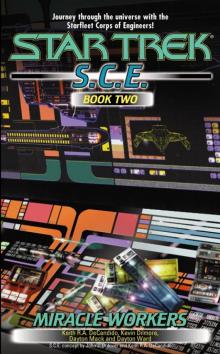 Miracle Workers
Miracle Workers Articles of the Federation
Articles of the Federation Supernatural Heart of the Dragon
Supernatural Heart of the Dragon War Stories: Book Two
War Stories: Book Two The Zoo Job
The Zoo Job Under the Crimson Sun
Under the Crimson Sun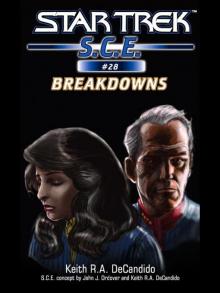 Breakdowns
Breakdowns Mermaid Precinct (ARC)
Mermaid Precinct (ARC) Supernatural 1 - Nevermore
Supernatural 1 - Nevermore STAR TREK - The Brave and the Bold Book One
STAR TREK - The Brave and the Bold Book One Four Walls
Four Walls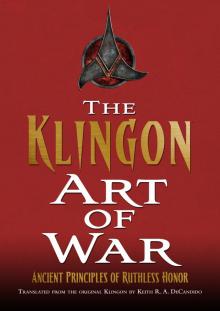 The Klingon Art of War
The Klingon Art of War Blackout
Blackout War Stories: Book One
War Stories: Book One The Brave and the Bold Book Two
The Brave and the Bold Book Two Honor Bound
Honor Bound Sleepy Hollow: Children of the Revolution
Sleepy Hollow: Children of the Revolution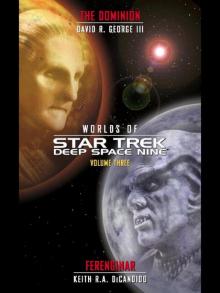 Worlds of Star Trek Deep Space Nine® Volume Three
Worlds of Star Trek Deep Space Nine® Volume Three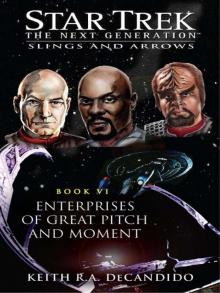 Star Trek: TNG: Enterprises of Great Pitch and Moment
Star Trek: TNG: Enterprises of Great Pitch and Moment Genesis
Genesis Demons of Air and Darkness
Demons of Air and Darkness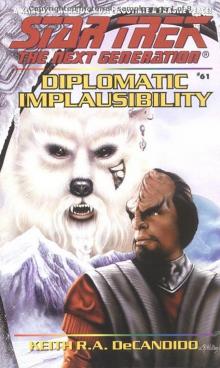 Star Trek - TNG - 61 - Diplomatic Implausibility
Star Trek - TNG - 61 - Diplomatic Implausibility Gryphon Precinct (Dragon Precinct)
Gryphon Precinct (Dragon Precinct) THE XANDER YEARS, Vol. 1
THE XANDER YEARS, Vol. 1 Nevermore
Nevermore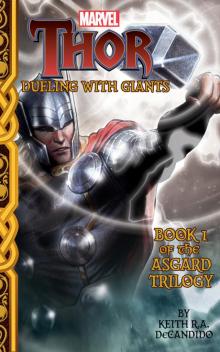 Thor
Thor The Brave And The Bold Book One
The Brave And The Bold Book One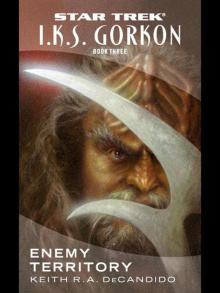 I.K.S. Gorkon Book Three
I.K.S. Gorkon Book Three STARGATE SG-1: Kali's Wrath (SG1-28)
STARGATE SG-1: Kali's Wrath (SG1-28) Bone Key
Bone Key Guilt in Innocece
Guilt in Innocece Star Trek - DS9 Relaunch 04 - Gateways - 4 of 7 - Demons Of Air And Darkness
Star Trek - DS9 Relaunch 04 - Gateways - 4 of 7 - Demons Of Air And Darkness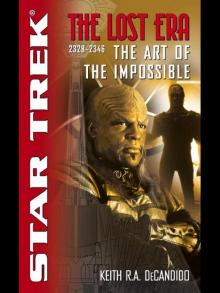 The Art of the Impossible
The Art of the Impossible I.K.S. Gorkon Book One: A Good Day to Die
I.K.S. Gorkon Book One: A Good Day to Die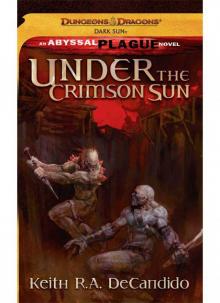 Under the Crimson Sun (the abyssal plague)
Under the Crimson Sun (the abyssal plague)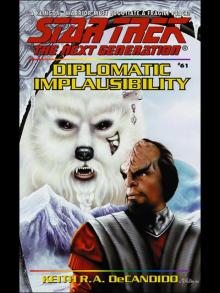 DIPLOMATIC IMPLAUSIBILITY
DIPLOMATIC IMPLAUSIBILITY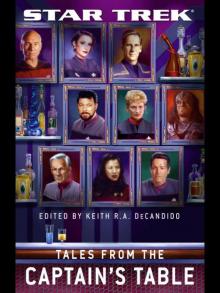 Tales from the Captain's Table
Tales from the Captain's Table A Burning House
A Burning House Cycle of Hatred (world of warcraft)
Cycle of Hatred (world of warcraft)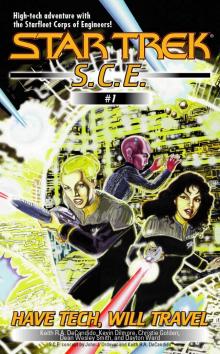 Have Tech, Will Travel
Have Tech, Will Travel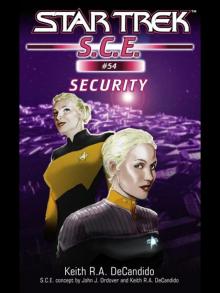 Security
Security